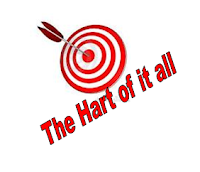Homework: It Fails Our Students and Undermines American Education
I know many of you are having philosophical debates with staff around the issue of homework . . . what it should look like, when it should be given, if it should be given, etc. This is a thought-provoking blog entry about homework and its relevance in today's classroom.
Mark Barnes is a junior high language arts teacher near Cleveland. He made the decision to give up homework. Barnes writes:
Homework: It Fails Our Students and Undermines American Education
Finding Balance
My selection this week comes from Dan Kerr, a middle school principal, and discusses the importance of finding balance in your life. With the holiday season coming up, I felt this article came at the perfect time. We all have more than enough on our plates and our lives continue to move at warp speed, but as Kerr states below it is imperative we make time for ourselves:
7 Steps to Effective Feedback
Over time, the ‘Connected Leader’ has featured several articles about providing effective feedback to students. The focus of this week’s article is principal providing meaningful feedback to teachers. The author, Shira Leibowitz, is a practicing building administrator who speaks to overcoming the challenges of restricted time.
As you know, one of the Characteristics of the Highly Effective Leader is “makes regular classroom visits and provides on-going feedback to teachers”. In our busy schedules and demanding roles, we must make time to observe the instructional practices of our teachers on a daily basis. Leibowitz offers 7 steps principals can take that would allow time to give effective feedback to teachers:
1. Schedule significant time in classrooms
2. Schedule time for formal conversations with teachers
3. Make feedback nonjudgmental and goal-focused
4. Focus on relationships and face-to-face interactions
5. Compliment
6. Be transparent with evaluation
7. Seek feedback for yourself.
7 Steps to Effective Feedback
I know many of you are having philosophical debates with staff around the issue of homework . . . what it should look like, when it should be given, if it should be given, etc. This is a thought-provoking blog entry about homework and its relevance in today's classroom.
Mark Barnes is a junior high language arts teacher near Cleveland. He made the decision to give up homework. Barnes writes:
"For more than a decade, I peppered students with mundane nightly activities, as I had been taught to do by education professors and mentors, all of whom ran the old-school teaching playbook, like a young football coach running the plays of Knute Rockne or Pop Warner — ancient coaching legends whose methods would likely fail in the modern era. Year after year, I watched students get low grades in my class and fail standardized tests, blaming them instead of questioning my own methods."Check out the blog. Do you agree or disagree with Barnes?
Homework: It Fails Our Students and Undermines American Education
Finding Balance
My selection this week comes from Dan Kerr, a middle school principal, and discusses the importance of finding balance in your life. With the holiday season coming up, I felt this article came at the perfect time. We all have more than enough on our plates and our lives continue to move at warp speed, but as Kerr states below it is imperative we make time for ourselves:
"We all work hard to be the best educators that we can be, and sometimes we feel guilty for taking time for ourselves…….I get it. Don’t lose yourself in the process everyone, and be sure to put yourself first. It’s my feeling that without the proper balance in your life, you’ll never be the educator that your students really need. We still have five weeks to go until the Holiday break, so take care of yourselves! You’ll be all the better for it, and your students will feed off of your new found energy. Have a great week everyone, and remember to be balanced for our students and good to each other."Finding Balance
7 Steps to Effective Feedback
Over time, the ‘Connected Leader’ has featured several articles about providing effective feedback to students. The focus of this week’s article is principal providing meaningful feedback to teachers. The author, Shira Leibowitz, is a practicing building administrator who speaks to overcoming the challenges of restricted time.
As you know, one of the Characteristics of the Highly Effective Leader is “makes regular classroom visits and provides on-going feedback to teachers”. In our busy schedules and demanding roles, we must make time to observe the instructional practices of our teachers on a daily basis. Leibowitz offers 7 steps principals can take that would allow time to give effective feedback to teachers:
1. Schedule significant time in classrooms
2. Schedule time for formal conversations with teachers
3. Make feedback nonjudgmental and goal-focused
4. Focus on relationships and face-to-face interactions
5. Compliment
6. Be transparent with evaluation
7. Seek feedback for yourself.
7 Steps to Effective Feedback
Healthier Testing Made Easy: The Idea of Authentic Assessment
We are reminded of a variety of analogies we've heard in the past...the soccer player who is unable to transfer the "drill and kill" to the playing field and the annual physical we try to "pass" rather than changing to a healthier lifestyle. Understanding how and when to put knowledge to use is an important characteristic of expertise. This is also the case for assessment of student learning. We have to reclaim the primary purpose of assessment, which is to help our students learn better and to help our teachers instruct better. Students deserve far, far more feedback (and the chance to use it) in our everyday assessment processes, especially assessment that models and demands "real-world" work.
What if your son or daughter came home more excited about the badge that proves he/she can critical think to the point that they are a "Young Sherlock" than they were receiving an A? Is it crazy to think that perhaps we are headed that way? Does a letter grade truly represent learning or work? Does a badge prove that our students learning was earned by them instead of given by the teacher? Why are students more excited about earning points on Modern Warfare and where they rank globally than if they receive an A or B? It means more to their peers. The value of a letter grade has declined in our students eyes because they can earn a C and pass just fine. However, if you earn a certain ranking in Mind Craft, LOOK OUT…now you've reached "cool" status. Is it hard to imagine that for some students, being the MInd Craft master is cooler than being the valedictorian? Interesting article that will challenge your thinking. Don't discard the thought that letter grades are losing value in the eyes of our customers.






No comments:
Post a Comment